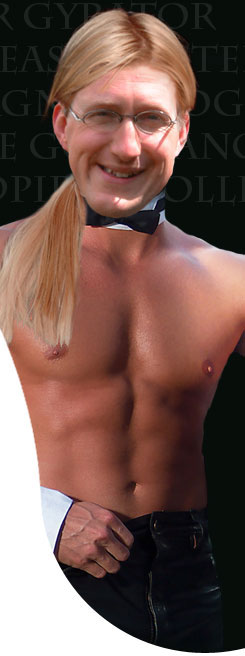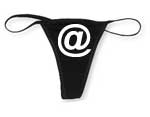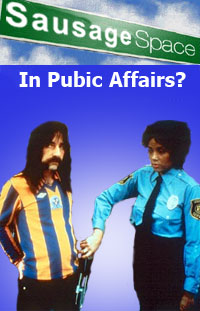Bernie Clifton's No. 1 Fan
 The green marker pen scrawled across the luminous orange sign read ‘If you give the Devil an inch, he’ll be your ruler’. It was pasted on the stone face of the old Methodist church that was hung some way back from the road where the bus turned into the station. Small hick town. Or at least, that’s what I thought. Blue collar. Middle America. Only it wasn’t. It was just the end of a thirty minute bus journey through some of the sorriest estates in the country. That’s the time it had taken to get me there. Half-an-hour having my fillings, my bones, even my wits shook loose by the cantankerous old engine. Half-an-hour of the scenery working my imagination even looser, of track-suits crouching outside bookmakers, Christmas decorations hanging from houses like dead bleached ivy, a rare patch of green grass with a sign planted into the dead centre. ‘No Ball Games’.
The green marker pen scrawled across the luminous orange sign read ‘If you give the Devil an inch, he’ll be your ruler’. It was pasted on the stone face of the old Methodist church that was hung some way back from the road where the bus turned into the station. Small hick town. Or at least, that’s what I thought. Blue collar. Middle America. Only it wasn’t. It was just the end of a thirty minute bus journey through some of the sorriest estates in the country. That’s the time it had taken to get me there. Half-an-hour having my fillings, my bones, even my wits shook loose by the cantankerous old engine. Half-an-hour of the scenery working my imagination even looser, of track-suits crouching outside bookmakers, Christmas decorations hanging from houses like dead bleached ivy, a rare patch of green grass with a sign planted into the dead centre. ‘No Ball Games’.
The bus smelled of piss and ointment, and new hairdos, blue rinsed perms as stiff as the pubic hairs on a porcupine. There’s a rule of thumb you can use when travelling by bus in small towns. The other people have free bus passes for a reason. They're pensioners, they are morbidly poor, or they have something seriously wrong with them. I’d been the only one paying money to the driver. Then I had settled down and listened to a woman with skin like a testicle describe her friend’s throat abscess. A guy in a seat ahead of me took no notice of the details but passed his time picking the scabs from his forearms which were covered by some mysterious rash. He was bull necked, brow at an shallow incline, balding. He looked like he could laugh off a beating with a tyre iron. He was the sort of guy you wanted as a friend, not as an enemy.
In these estates, as run down as they are, there are always signs of opulence if you look for them. Fifty inch LCD screens light up living rooms, kids carry mobile phones worth almost as much as their trainers. A brand new Bentley Continental GT is parked beside the rolled down rusted blinds of a refurbished bookmakers. Yet the town had also changed a lot since the last time I was there. New government money had gone into new architecture that I found myself liking for once. A new façade on the railway station was abstract, black, herringbone, acute against the sky. A steel needle loomed over the shopping centre. I liked all the small touches that had dressed up a town that prides itself on having at least one cultural highlight in its own museum of public transport.
Yet the most abstract thing of all was yet to come.
My imminent birthday had taken me there. After an hour, I’d walked a full circuit of the town and I was coming out of a small independent bookshop, one of the rarer things to find in any small town these days, with a copy of Martin Amis’ ‘House of Meetings’ in my hand. Preoccupied as I put the book in my rucksack, I turned back into the heart of the town centre. I walked slowly past the pub where, in my student days, I’d hang out with friends, and past the entrance to the old college which is in the process of being knocked down. And I was full of these slightly wistful thoughts as I began to walk behind two men.
The first man carried a bucket and, beyond that, I remember very little about him. My attention was too taken by the other. He was wearing the bottom half of an ostrich outfit, with thin tired orange nylon tights hanging a little loose on legs not built for public display. He had an edgy look about him, nervous, oddly wound up, like a boxer about to go into the ring. He was full of terse movements, ready to put on a performance. He held the ostrich’s head up, twitching it occasionally with a bit of metal fashioned into an imitation harness and reins. I smiled at the outfit and began to walk past them when the second man flicked his hands and the ostrich head reared up at me. Instinctively I jumped back but the head anticipated my move. It twisted and went to peck my behind like it must have pecked hundreds of behinds before mine. I was about to smile, to laugh, to say something funny...
Then I took in the guy’s face.
You have to know that Bernie Clifton is something of a hero of mine. It’s probably why I failed to react as I would have hoped I would react. I didn’t shake his hand. I didn't say how much I’ve loved his act. Nor did I say how much I loved watching him when I was a child. I didn't say how I only got through so many miserable school weeks in order to watch him every Friday. I didn’t say how much I admired his spirit, his character, his comedy. I didn’t say how glad I am to see that he’s still going. I should really have told him to put something on over his charity t-shirt and ostrich tights, and that it was too cold to be raising money for charity on a cold rainy day at the beginning of October. I didn’t do any of these things. To my shame, I didn’t even put money in the bucket. In fact, to tell you the truth, I ran off. I crossed the road and spent the next ten minutes looking back at this great comedian, hamming it up for people, many of whom didn’t know who he was.
And I was standing there in the rain, a few feet from one of my earliest comedy heroes.
Eventually I had to walk away but, in every shop I went into, I would find a way to say that I’d just been assaulted by Bernie Clifton and his ostrich. A few people knew who I meant, but others looked at me blankly and I had to describe in ten words or less the career of the comedian who came to fame on Crackerjack.
CRACKERJACK!
I suppose it’s one of those old deep admirations that’s hard to describe. My comedy heroes today are Larry David, W.C. Fields, Groucho, Woody Allen, or even relatively unknown comic writers such as S.J. Perelman or David Nobbs. But none of those men had a say in how I grew up. Bernie Clifton did.
He is also a comedian hard to fit into a category. 'Anarchic' only begins to do him justice. Perhaps that’s why as children we loved him. Back then, proper comedians told jokes, with their thumbs tucked in deep-blue crushed-velvet waistcoats, with large vulgar rings on their equally large vulgar fingers. In the glare of the spotlight and a halo of tobacco smoke, they would sweat from bad health or, perhaps, as we now like to think and hope, self-realisation that they were fat, obnoxious, xenophobic misogynists whose days were gone. Yet even if Clifton came up through the same clubs, he was somehow different. He was childish, he was a buffoon, he was... He was whatever he still is. He was silly, unpredictable, and in as innocent a way as you could get at five to five on a Friday, he was totally dangerous.
The ostrich was and is a comic masterpiece, but unlike Rod Hull’s emu which had some notional pretence of being real, the ostrich is pure comic over-statement. Rod Hull never gave away the game. There was never a hint that it was a fake arm holding the bird. There was no such pretence with Clifton and his ostrich. It’s as though he doesn’t want you to believe it is real, which makes it something else. It is more like a surrealist masterpiece, some totally non-rational being that leaps out and assaults you. It was modern comedy before there was modern comedy. Without the costume, Bernie Clifton would be jailed. And he would probably deserve it.
I didn’t think any of these thoughts at the time, though I had the capacity to say them if asked why I was standing, dumbstruck, in the centre of this extremely working class down in the rain on a Thursday in October. And I might have also have said that Clifton looked older than I remembered him; that the costume was looking more bedraggled too. I might have said it was a rainy day for grey faces, for grey clowns. But nobody did ask me what I thought. And that really did not matter.
This town is one of two of my youth I sometimes go back and visit. The other is ultra-modern, with expensive shops, and it aspires to have a cafe-culture around its new arts and cultural centre. It is full of people who aspire to something better, or at least, aspire to a lifestyle designed by Debenhams. But this town… this town is working class and grim. On the way home, the bus stopped at some traffic lights. I looked out and saw a small man with a clenched face, more chin than lips, walking through the traffic. He was wearing a horrendous yellow and purple woollen hat and he carried two plastic bags filled with food, cigarettes, lager. He was oblivious to the traffic, walked slightly flat footed, caught up in his own world as he smoked the last of a fag end. He reminded me of my grandfather I’ve only ever seen in photographs. It made me think again of the two towns, of the other town which represents what I’d like to be, and that town which told me something about what I’ve come from.
Clifton is of that same world, where knock kneed men in yellow ostrich costumes can walk the streets. I used to hate the town. Today I found a reason to beginto like it again.
I just wish I’d had the nerve to say some of this to the great Bernie Clifton.






5 comments:
Shame on you - Thongster!
I know. Shame on me for many things, though putting something in the charity bucket was the least of my sins. At the very least, I should have given Bernie a Chip Dale thong to remember me by...
Was he not rummaging through skips?
Some brilliantly inventive description there, Chip. One of your best ever posts.
Great post, sad and weird at the same time.
Post a Comment